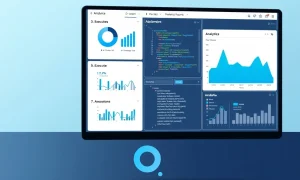The intersection of technology and real estate is rapidly reshaping how properties are bought and sold. Furthermore, companies like Opendoor are at the forefront of this transformation. Recently, Opendoor stock has experienced a significant surge, captivating investors and market observers alike. This rise is largely attributed to the company’s aggressive embrace of artificial intelligence (AI) to streamline its iBuying model. However, while the allure of technological advancement and potential returns is strong, astute investors must approach this opportunity with caution. Understanding both the promise and the perils associated with Opendoor’s strategy is crucial for making informed decisions in this dynamic sector.
Opendoor Stock: The AI Catalyst and Recent Surge
Opendoor Technologies (NASDAQ: OPEN) has positioned itself as a pioneer in the iBuying space. Essentially, this model involves purchasing homes directly from sellers, making necessary renovations, and then reselling them. This process aims for speed and convenience for homeowners. Consequently, the company’s recent stock performance reflects a renewed investor confidence, primarily fueled by its enhanced focus on artificial intelligence. The market has reacted positively to Opendoor’s narrative of leveraging AI to achieve greater efficiency and scale. This positive sentiment has driven significant upward movement in Opendoor stock.
The company’s AI initiatives are not merely theoretical. Instead, they are deeply integrated into its core operations. These advancements span several critical areas:
- Algorithmic Pricing: AI models analyze vast datasets to generate instant, competitive cash offers for homes.
- Renovation Optimization: AI helps identify the most impactful and cost-effective renovations, maximizing resale value.
- Logistics and Operations: AI streamlines everything from scheduling inspections to managing inventory.
Therefore, these technological improvements aim to reduce holding costs and increase profit margins. Investors view these efforts as key to unlocking long-term profitability for Opendoor. This perception has translated directly into the recent bullish trend observed in Opendoor stock performance.
Decoding Opendoor’s AI Strategy in Real Estate
Opendoor’s commitment to AI is a strategic cornerstone of its business model. The company’s AI-powered platform seeks to eliminate the traditional complexities and uncertainties of selling a home. Historically, selling a home involves multiple steps, including agent commissions, showings, and lengthy closing periods. Opendoor aims to disrupt this by offering a simpler, faster alternative. Their proprietary algorithms are central to this promise.
Specifically, these algorithms process an enormous amount of real estate data. This data includes property characteristics, local market trends, historical sales, and even neighborhood amenities. By doing so, Opendoor can generate precise, data-driven offers. This capability allows the company to make quick decisions, a significant advantage in a fast-moving housing market. Furthermore, AI helps Opendoor predict future market movements, guiding their buying and selling strategies. This sophisticated approach sets Opendoor apart from traditional real estate players. Ultimately, the effectiveness of this AI will heavily influence the long-term trajectory of Opendoor stock.
The Allure and Risks of iBuying with AI for Opendoor Stock
The iBuying model, powered by AI, offers compelling advantages. Sellers often prioritize convenience and speed. Opendoor delivers on these fronts, providing cash offers and flexible closing dates. This value proposition has attracted a significant number of homeowners. For Opendoor, AI’s efficiency gains are crucial for scaling operations and maintaining competitive pricing. However, the iBuying model also carries inherent risks, which investors in Opendoor stock must consider carefully.
Key risks include:
- Market Volatility: Housing markets are cyclical. Downturns can quickly erode property values, leaving Opendoor with depreciating inventory.
- Algorithmic Limitations: While powerful, AI models rely on historical data. They may struggle to predict unforeseen market shifts or ‘black swan’ events accurately.
- Operational Costs: Acquiring, renovating, and holding properties incurs substantial costs. High interest rates further exacerbate these expenses.
- Competition: Other iBuyers and traditional real estate agents constantly adapt, intensifying the competitive landscape.
These challenges highlight the delicate balance Opendoor must maintain. The company needs to achieve high transaction volumes while also managing risk exposure effectively. Failing to do so could significantly impact the performance of Opendoor stock.
Understanding the ‘Buyers Beware’ for Opendoor Stock Investors
Despite the recent surge in Opendoor stock, a ‘buyers beware’ sentiment remains prudent for several reasons. Investing in a company heavily reliant on a nascent technology like AI in real estate involves unique considerations. First, the profitability of the iBuying model has historically been inconsistent. Opendoor has faced challenges in consistently achieving positive net income. This is a critical factor for long-term investor confidence. While AI aims to improve this, its ultimate impact on sustained profitability is still unfolding.
Secondly, the housing market itself presents a significant variable. Rising interest rates can cool buyer demand and reduce home price appreciation. Such conditions directly challenge Opendoor’s ability to buy, renovate, and resell homes profitably. A slower market means longer holding times and increased costs. Moreover, the accuracy of AI models can be tested under rapidly changing market conditions. If the market shifts unexpectedly, Opendoor’s algorithms might misprice properties, leading to losses. Therefore, investors must weigh the potential for technological advancement against the inherent volatility of the real estate sector when evaluating Opendoor stock.
The Road Ahead: Challenges and Opportunities for Opendoor Stock
Opendoor’s journey is far from over. The company faces ongoing challenges, but also significant opportunities. On the challenge front, achieving consistent profitability remains paramount. Scaling operations while maintaining quality and efficiency is a complex endeavor. Furthermore, consumer perception and trust in the iBuying model continue to evolve. Opendoor must demonstrate its value proposition clearly and consistently to attract both sellers and buyers. Competition from both traditional real estate brokerages and other tech-enabled platforms also poses a threat.
However, the opportunities are equally compelling. The vastness of the U.S. housing market provides ample room for growth. If Opendoor can refine its AI, optimize its operations, and adapt to market changes, it could capture a larger share of transactions. Continuous innovation in AI, such as predictive analytics for localized market trends or personalized renovation recommendations, could further enhance its competitive edge. Ultimately, the future performance of Opendoor stock will hinge on the company’s ability to navigate these complexities and capitalize on its technological advancements.
Opendoor Stock: A Balanced Perspective for Investors
In conclusion, Opendoor’s aggressive pivot towards AI has undoubtedly revitalized investor interest, leading to a notable surge in Opendoor stock. The promise of an efficient, tech-driven real estate transaction model is attractive. Opendoor’s commitment to leveraging AI for algorithmic pricing and operational efficiency positions it as a significant player in the evolving real estate landscape. However, the ‘buyers beware’ caution is well-founded. The inherent risks of market cyclicality, operational complexities, and the unproven long-term profitability of the iBuying model persist.
Investors should conduct thorough due diligence. They must consider the company’s financial health, its ability to adapt to market shifts, and the competitive environment. While AI offers a powerful tool, it is not a guaranteed solution to all challenges. The real estate market remains fundamentally sensitive to economic factors. Therefore, a balanced perspective, acknowledging both the innovative potential and the significant risks, is essential for anyone considering an investment in Opendoor stock. Informed decisions will always yield better outcomes in volatile markets.
Frequently Asked Questions (FAQs) about Opendoor Stock
1. What is iBuying, and how does Opendoor use it?
iBuying is a process where companies use technology to make instant cash offers for homes, purchase them, and then resell them. Opendoor utilizes advanced AI algorithms to quickly assess property values, generate offers, and manage the renovation and resale process efficiently. This model aims to provide sellers with speed and convenience.
2. Why has Opendoor stock been surging recently?
The recent surge in Opendoor stock is primarily attributed to increased investor confidence in its AI-driven strategy. The company’s focus on leveraging artificial intelligence for improved efficiency, algorithmic pricing, and optimized operations has been positively received by the market, suggesting potential for future profitability and growth.
3. What are the main risks associated with investing in Opendoor stock?
Key risks include the cyclical nature of the housing market, which can impact property values; the inherent operational costs of buying, renovating, and holding homes; intense competition from other iBuyers and traditional agents; and the potential limitations of AI models in predicting unforeseen market shifts. Profitability has also been inconsistent historically.
4. How does AI specifically help Opendoor’s business model?
AI assists Opendoor in several ways: it provides accurate algorithmic pricing for instant offers, optimizes renovation strategies to maximize resale value, and streamlines logistics and operational workflows. These applications aim to reduce costs, improve efficiency, and enhance the overall scalability of the iBuying process.
5. Is Opendoor stock a good long-term investment?
Evaluating Opendoor stock as a long-term investment requires careful consideration of its potential for sustained profitability, its ability to navigate market downturns, and its competitive positioning. While AI offers significant potential, investors should weigh these technological advantages against the inherent risks and volatility of the real estate market before making long-term commitments.






















